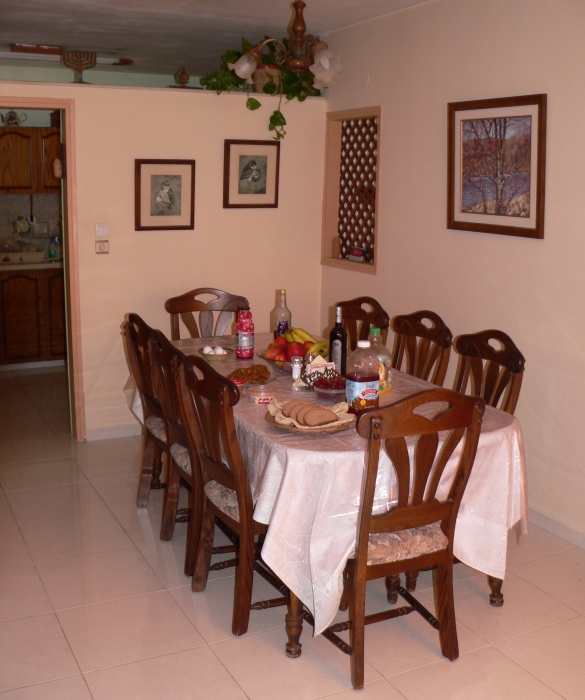
 |
[Updated: 2023.11.17] ![]()
 |
Shul•khãnꞋ; table. Also
הַשֻׁלְחָן לֶחֶם פָּנִים (the Table of Bread of the Inner-Sanctum, or Bread of Display, lit. "Bread of the Face" or "Interior Bread"; Shᵊm•otꞋ 25.23-30)
See also the prophecy of all Hellenists conspiring at one שֻׁלְחָן in Dãniy•eilꞋ 11.27 and [Wisdom] עָרְכָה שֻׁלְחָנָה (Mi•shᵊl•eiꞋ ShᵊlomꞋoh 9.2).
From antiquity, in the Middle Eastern world one's (dining) table has been a metonym for Miz•beiꞋakh. While this has been almost completely lost in the Christian world, Tor•ãhꞋ Jews, particularly since the destruction of the Beit ha-Miq•dãshꞋ, still regard their— kã•sheirꞋ(!)—dining table as the mnemonic symbol recalling the Miz•beiꞋakh. "After the destruction of the [Beit ha-Miq•dãshꞋ], a [religious] Jew's home [kã•sheirꞋ] שׁוּלחָן is regarded as taking the place of the [Miz•beiꞋakh] (cf. To•sëphꞋtã, Ma•sëkꞋët Sot•ãhꞋ 15.11-13), and it was said 'Now that there is no [Miz•beiꞋakh], [the religious Jew's home] שׁוּלחָן serves instead for him' (Ber. 55a; Men. 97a). The halakhic authorities explain many table customs on this basis (Shibbolei ha-Leket, Buber's ed., 141; Sefer Hasidim, 102)." ("Altar," EJ 2.770-71).
It is in this context that the primary threat against Hellenist assimilation in the 1st century C.E. is evident in The Nᵊtzãrim Reconstruction of Hebrew Matitᵊyãhu (NHM, in English)![]() 15.27, below) as well as in Christian NT. Even the Hellenist accounts confirm the prohibition against eating with goy•imꞋ, describing such assimilation as "eating at the τραπεζα of demons and Sã•tãnꞋ", thereby transgressing the mitz•wãhꞋ by co-mingling their τραπεζα with, lᵊ-hav•dilꞋ, the שֻׁלְחָן of י--ה (although the exclusive usage of Greek in the NT, contrasting τραπεζα against τραπεζα, begs the question:
15.27, below) as well as in Christian NT. Even the Hellenist accounts confirm the prohibition against eating with goy•imꞋ, describing such assimilation as "eating at the τραπεζα of demons and Sã•tãnꞋ", thereby transgressing the mitz•wãhꞋ by co-mingling their τραπεζα with, lᵊ-hav•dilꞋ, the שֻׁלְחָן of י--ה (although the exclusive usage of Greek in the NT, contrasting τραπεζα against τραπεζα, begs the question: Apostle St. Paul" the Apostate-Letter 4 (I Corinthians) 10.18, 20-21; "Apostle St. Paul" the Apostate-Letter 6 (Romans) 11.9).
21 [
RibꞋi ]Yᵊho•shuꞋa crossed from there 15.21.1 and went to Tzor 11.21.1 and Tzi•donꞋ 15.22.1 LᵊvãnonꞋ. 22 Then look, a Kᵊna•an•itꞋ 15.22.1 Hellenist-Jewess 1.0.2 from the lands of thegãl•utꞋ in Syria-Jordan,15.22.2 was following him. She was shouting 15.22.3 and saying to him, "Prithee,a•don•iꞋ 22.43.2 Bën-Dã•widꞋ , Look, my daughter is phobic from an evil 21.41.1ruꞋakh ." 1.18.6 23 He didn't reply a saying 12.37.0 to her, and histal•mid•imꞋ 5.1.1 approached him and requested 15.23.1 him saying, "Please forgive her concerning what she is shouting about behind us." 24 He replied, saying to them, "I am not sent except to the flock being lost of BeitYi•sᵊrã•eilꞋ ." 15.24.1 25 The woman came and paid obeisance 2.2.2 to him and said, "A•don•iꞋ ,22.43.2 save 15.25.1 me!" 26Yᵊho•shuꞋa replied and said to her, "One is not to rob bread from the sons and give it to dogs." 15.26.1 27 The woman replied, "Yet, even dogs eat the crumbs falling from the τραπεζα of theira•don•imꞋ ." 15.27.1 28Yᵊho•shuꞋa replied and said, "What a woman, with such greatëm•un•ãhꞋ 8.10.1 like yours! You shall have your wish." And her daughter was healed 8.8.1 at that time.15.28.1
18 Behold genetic
Yi•sᵊrã•eilꞋ : are not they who eat of the sacrifices κοινωνοι in the Altar? … 20 But I [say], that which the ethnos goyim sacrifice, they sacrifice to demons, not to θεω: and I'm not willing for you to be κοινωνους with demons. 21 You cannot drink the cup of ha-•donꞋ , and the cup of demons: you cannot μετεχειν the τραπεζα of ha-•donꞋ and the τραπεζα of demons.
 |
 |